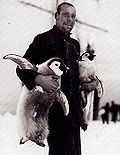Weddell Sea party
| Name | Life | Boat | Position | Additional information | |
|---|---|---|---|---|---|
 | Sir Ernest Shackleton | 1874–1922 | James Caird | Commander | James Caird rescue crew |
 | Frank Wild | 1873–1939 | James Caird | Second-in-command | Cape Wild namesake |
 | Frank Worsley | 1872–1943 | Dudley Docker | Captain | James Caird rescue crew |
 | Frank Hurley | 1885–1962 | James Caird | Photographer | |
 | Hubert Hudson [b] | 1886–1942 | Stancomb Wills | Navigator | Original Stancomb Willis captain |
 | Lionel Greenstreet | 1889–1979 | Dudley Docker | First officer | |
 | Tom Crean | 1877–1938 | Stancomb Wills | Second officer | James Caird rescue crew |
 | Alfred Cheetham | 1867–1918 | Dudley Docker | Third officer | |
| Lewis Rickinson | 1883–1945 | Stancomb Wills [c] | Chief engineer | Suspected heart attack on Elephant Island | |
| Alexander Kerr | 1892–1964 | Dudley Docker | Second engineer | ||
| James McIlroy | 1879–1968 | Stancomb Wills | Surgeon | ||
 | Alexander Macklin | 1889–1967 | Dudley Docker | Surgeon | |
 | Robert Clark | 1882–1950 | James Caird | Biologist | |
 | Leonard Hussey | 1891–1964 | James Caird | Meteorologist | |
 | James Wordie | 1889–1962 | James Caird | Geologist | |
 | Reginald James | 1891–1964 | James Caird | Physicist | |
 | | | George Marston | 1882–1940 | Dudley Docker | Artist | |
 | Thomas Orde-Lees | 1877–1958 | Dudley Docker | Storekeeper; motor expert | |
 | Harry "Chippy" McNish [d] | 1874–1930 | James Caird | Carpenter | James Caird rescue crew; not recommended for Polar medal |
 | Charles Green | 1888–1974 | James Caird | Cook | |
| William Stephenson | 1889–1953 | Stancomb Wills | Fireman; stoker | Not recommended for Polar medal | |
| Ernest Holness | 1892–1924 | Dudley Docker | Fireman; stoker | Not recommended for Polar medal | |
 | John Vincent | 1879–1941 | James Caird | Able seaman | James Caird rescue crew; not recommended for Polar medal |
| Timothy McCarthy | 1888–1917 | James Caird | Able seaman | James Caird rescue crew | |
| Walter How | 1885–1972 | Stancomb Wills | Able seaman | ||
| | William Bakewell | 1888–1969 | Stancomb Wills | Able seaman | Recruited in Buenos Aires; American claiming to be Canadian |
| Thomas McLeod | 1869–1960 | Dudley Docker | Able seaman | ||
 | Perce Blackborow [e] | 1894–1949 | Stancomb Wills | Steward | Stowaway; hidden aboard by Bakewell; gangrenous toes of left foot amputated |
| Sir Daniel Gooch | 1869–1926 | Dog handler | Returned home after South Georgia stop | ||
| | Mrs Chippy | –1915 | McNish's male cat; shot after Endurance sinking |

